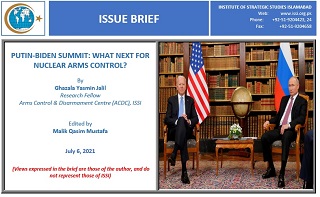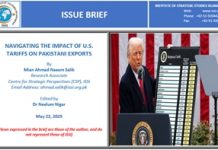The US President, Joe Biden, and Russian President, Vladimir Putin, met on June 16, 2021, in Geneva for the first time since the new US administration took over. The Biden-Putin summit comes at a time when relations between the two countries are at their lowest. There were low expectations from the summit but both presidents were expected to pursue issues related to nuclear arms control and move things beyond New START renewal. It is imperative to discuss what needs to be done by the two countries to strengthen arms control and uptake matters that are of concern to both and negatively impact strategic stability. Discussions on nuclear arms control are increasingly important given the drive for nuclear weapons modernisation, the pursuit of new nuclear weapons and the pursuit of ballistic missile defence and hypersonic weapons by major powers.
During the summit, both presidents made some pledges that are a good start for the arms control road ahead. They said in a joint statement that “recent extension of the New START Treaty exemplifies our commitment to nuclear arms control. Today, we reaffirm the principle that a nuclear war cannot be won and must never be fought.” They also pledged that they will “embark together on an integrated bilateral Strategic Stability Dialogue in the near future that will be deliberate and robust. Through this Dialogue, we seek to lay the groundwork for future arms control and risk reduction measures.”[1] President Putin said that the two countries share the responsibility for nuclear stability and would also hold talks on possible changes to the New START. While President Biden said that the strategic stability dialogue is a way to get “our military experts and our diplomats together to work on a mechanism that can lead to the control of new and dangerous and sophisticated weapons that are coming on the scene now that reduce the times of response, that raise the prospects of accidental war.”[2] It is certainly a step in the right direction. However, the dialogue needs to be frequent, comprehensive and meaningful.















